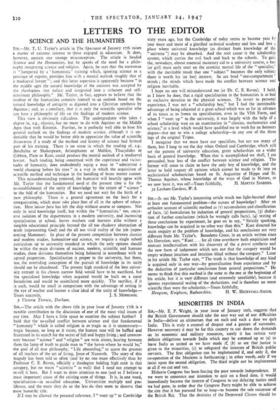LETTERS TO THE EDITOR
SCIENCE AND THE HUMANITIES
Six,—Mr. T. U. Taylor's article in The Spectator of January 17•th raises a matter of extreme interest to those engaged in education. It does, however, contain one strange misconception. The article is headed Science and the Humanities, but he speaks of the need for a philo- sophy integrating science and religion. Again, he says that the statesman is " hampered by a ' humanistic ' training which, ignoring science as a province of experts, provides him with a mental oudcok roughly that of a mediaeval lawyer " ; and this latter aspersion is apparently because " in the middle ages the natural knowledge of the ancients was accepted by the theologians (my italics) and integrated into a coherent and self- consistent philosophy." Mr. Taylor, in fact, appears to believe that the student of the humanities commits himself to an outlook based on the natural knowledge of antiquity as digested into a Christian synthesis by Aquinas ; and, as a corollary, that it is only the scientific specialist who can base a philosophy of life on the findings of modem science.
This view is obviously ridiculous. The undergraduate who takes 3 degree in, e.g., classics, has no more to do with Aquinas or the Middle Ages than with Einstein. Further, he is perfectly well able to base his general outlook on the findings of. modern science, although it is un- deniable that he would be better able to appreciate the value of scientific discoveries if a study of the method and history of science had formed part of his training. There is no sense in which the reading of, e.g.. Aeschylus or Shakespeare, Aristophanes or Moliere, Thucydides or Gibbon, Plato or Kant, could produce the, mental outlook of a mediaeval lawyer. Such reading, being concerned with the experience and vicissi- tudes of humanity, does undoubtedly equip a man to " administer a world changing before his eyes " in a way in which the acquisition of scientific method and technique in the handling of brute matter cannot.
This misunderstanding removed, the humanist will heartily agree with Mr. Taylor that the fundamental need at the present time is for the re-establishment of the unity of knowledge by the return of " science " to the fold of the humanities. But we need not wait for the birth of a new philosophy. There is a general agreement on the basis for a reorganisation, which must take place fiat of all in the sphere of educa- tion. Here laisser faire has left the ship without course or compass. Not only in total knowledge itself, but within the "humanities," too, exces- sive isolation of the departments in a modern university, and increasing specialisation at school, leaves teachers and learners alike without a tangible educational principle beyond the all too shadowy abstraction of truth (representing God) and the all too vivid reality of the job (repre- senting Mammon). In place of the present competition between classics and modem studies, humanities' and science, we require a single school curriculum up to university standard in which the only options should be within the main divisions of ancient, modern, scientific and humane studies, these divisions themselves being balanced in accordance with an agreed proportion. Specialisation is proper to the university, but there, too, the overriding conception of the pursuit of knowledge in its unity should not be abandoned. The present high standard of the best univer- sity entrant in his chosen narrow field would have to be sacrificed, but the specialised knowledge when acquired would be built on a surer foundation and would be assimilated more quickly. The sacrifice, if it is such, would be small in comparison with the advantage of setting in the eye of teacher and learner a clear ideal of the unity of knowledge.—


































 Previous page
Previous page